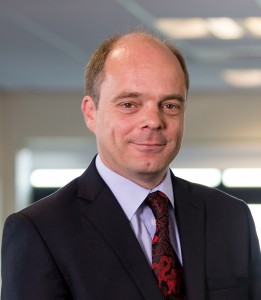Bath’s largest accountancy firm Bishop Fleming has welcomed the brakes being put on Making Tax Digital for business, after the government admitted it needed more time.
Sole traders, partnerships and landlords with income above £85,000 were to be forced into keeping their accounts in a digital form and filing quarterly updates to HM Revenue & Customs from April 2018 for income tax purposes, though companies would have joined the regime later. 
The £1.3bn project in its original form has now been put back to at least 2020, probably later, and will likely be revised to reflect criticism from business groups and MPs.
Businesses will now have far more time to prepare before joining quarterly reporting, and small businesses won’t have to join at all. VAT registered businesses will need to keep digital VAT records from 2019.
Bishop Fleming head of tax Andrew Browne, pictured, welcomed the tax reporting amnesty and claimed it had been “doubtful in the extreme” that Making Tax Digital would have been ready by next year.
“With the government taking its foot off the digital tax accelerator, businesses will no longer be frog marched into quarterly returns for the foreseeable future, allowing more time for lessons to be learnt from an ongoing pilot scheme,” he said.
“The smallest businesses and landlords will be much relieved that they will not have to file tax returns four times a year.
“It is clear that a great deal more scrutiny is needed before the Making Tax Digital project can proceed. The astonishing revelation earlier this year that the tax office was asking people to submit paper returns because its computers could not cope with the complexity of new rules on dividends was a clarion call for a rethink.”
Earlier this year Bishop Fleming called for a delay in Making Tax Digital as it appeared too rushed and too unclear. The firm endorsed a report from MPs on the Treasury Select Committee calling for a delay of at least one or two years to avoid putting businesses at risk.
Mr Browne added: “A time for reflection will result in much clearer and better thought through rules to allow for a smoother digital tax revolution and avoid the project becoming Making Tax Diabolical. Whether there will be full compulsory quarterly reporting this side of the next General Election in 2022 appears questionable.”
He also called for the 22,000-page tax system to be simplified as part of the digitalisation project, so that it can be even understood by a computer. Bishop Fleming also has offices in Bristol, Exeter, Plymouth, Torquay, Truro and Worcester.



















